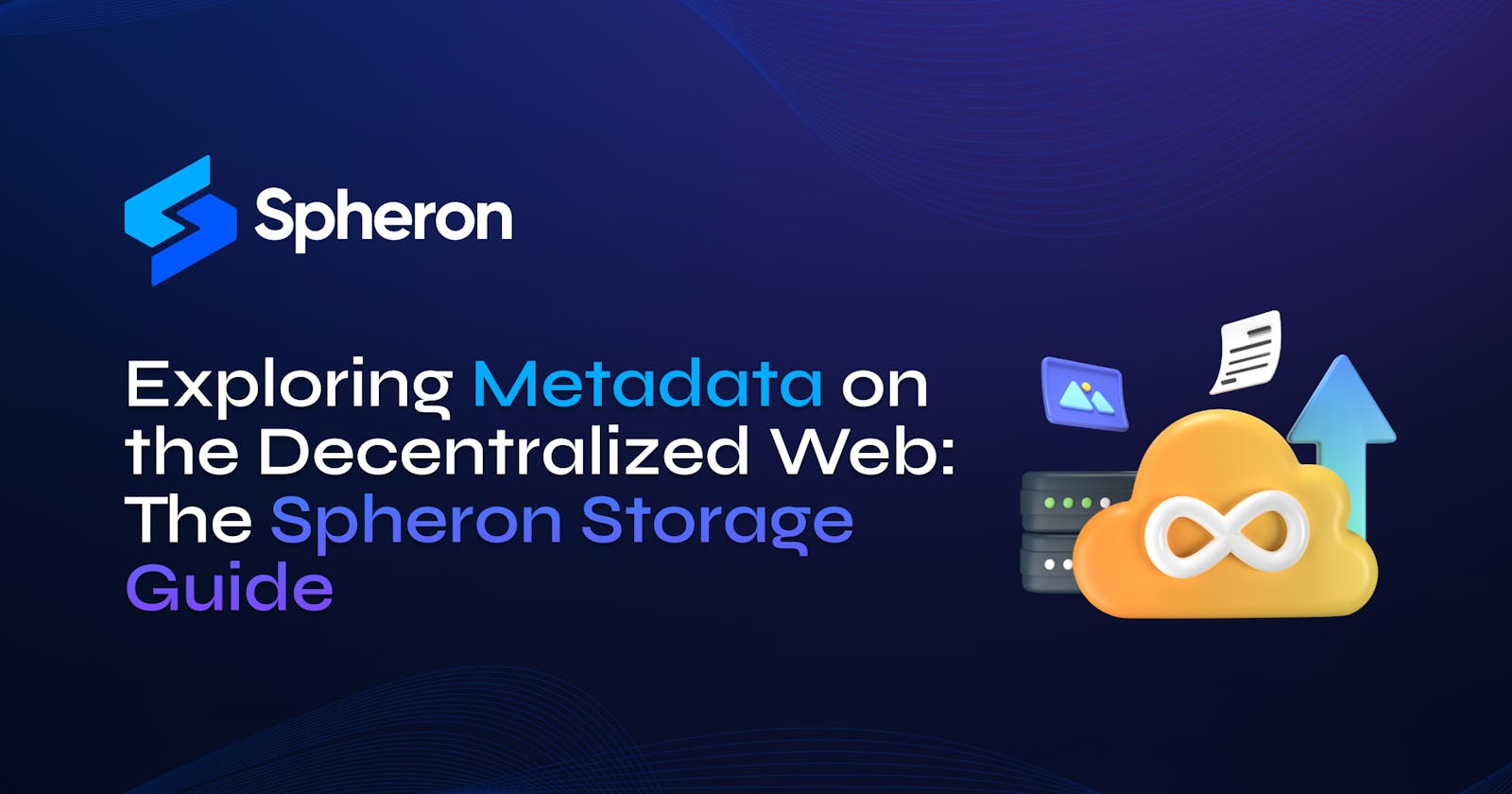Phase 1: Understanding the Role of Metadata
The decentralized web, powered by technologies like IPFS (InterPlanetary File System), is transforming the way we store and access data. However, efficient data management in a decentralized environment requires more than just uploading files. Metadata plays a crucial role in organizing, retrieving, and understanding the content on the decentralized web. In this guide, we’ll explore the significance of metadata and how to use Spheron Storage to manage it effectively.
What is Metadata?
Metadata is data about data. It provides essential information about a file, making it easier to search, categorize, and understand. In a decentralized context, metadata can include details like file names, descriptions, creators, timestamps, and more. Without metadata, decentralized data would be akin to a library with books lacking titles and author names.
The Importance of Metadata
1. Efficient Data Retrieval
Metadata acts as a map, guiding users to the exact location of the content they seek. Imagine searching for a specific image in a vast collection of decentralized files. Metadata allows you to find that image quickly by filtering based on criteria like keywords, dates, or file types.
2. Content Understanding
Metadata provides context to data. It explains what the file is, who created it, and when it was last modified. This context is vital, especially when dealing with content like NFTs (Non-Fungible Tokens) or unique digital assets. Metadata turns an image file into a “CryptoPunk #1234” with a description, making it more valuable and informative.
3. Dynamic Content
Metadata can be dynamic, enabling real-time updates and interactions. For instance, metadata associated with an NFT can change based on its ownership, allowing the NFT to display the current owner’s name or auction details. This dynamic aspect adds versatility and functionality to decentralized applications.
Phase 2: Uploading Metadata with Spheron Storage
Prerequisites
Before we proceed, make sure you have the following:
Node.js installed on your computer.
An authentication token from Spheron Storage, which you can obtain from your account. Refer to the doc here to create an access token at Spheron.
Uploading Metadata
Now, let’s see how to upload metadata to IPFS using Spheron Storage. Create a metadata.json file with the required information according to your requirements.
Code Example
import { SpheronClient, ProtocolEnum } from "@spheron/storage";
import fetch from "node-fetch";
import chalk from "chalk";
import Table from "cli-table3";
import figlet from "figlet";
const token = "YOUR_AUTH_TOKEN";
const client = new SpheronClient({ token });
const filePath = "./metadata.json";
async function uploadFileToIPFS(configuration) {
const uploadResponse = await client.upload(filePath, configuration);
console.log(chalk.green(`🚀 File uploaded successfully with ID: ${uploadResponse.uploadId}`));
return uploadResponse;
}
In this code, we import the necessary modules and set up the environment. Then, we define an asynchronous function to upload a JSON file (metadata) to IPFS using Spheron Storage.
Phase 3: Accessing and Displaying Metadata
Now that we’ve uploaded metadata, let’s explore how to access and display it in a user-friendly manner.
Code Example
async function fetchFromIPFS(protocolLink) {
const jsonFileUrl = `${protocolLink}/metadata.json`;
console.log(chalk.magenta(`🚀 Link to the JSON Data uploaded: `), jsonFileUrl); try {
const response = await fetch(jsonFileUrl);
if (!response.ok) {
throw new Error(`HTTP error! Status: ${response.status}`);
}
const jsonData = await response.json();
return jsonData;
} catch (error) {
console.error(chalk.red("❌ Error fetching data from IPFS:"), error);
throw error;
}
}
function displayHeading(text) {
console.log(
chalk.yellow(figlet.textSync(text, { horizontalLayout: 'full' }))
);
}
function displayJsonAsTable(jsonData) {
const table = new Table({
head: [chalk.blue('Key'), chalk.blue('Value')],
colWidths: [30, 70]
});
for (const key in jsonData) {
if (jsonData.hasOwnProperty(key)) {
table.push([key, jsonData[key]]);
}
}
console.log(table.toString());
}
async () => {
displayHeading("Spheron - Storage 🌐");
try {
// Define the configuration for the upload
const configuration = {
name: "metadata upload",
protocol: ProtocolEnum.IPFS,
onUploadInitiated: (uploadId) => {
console.log(chalk.magenta(`🔗 Upload initiated with ID: ${uploadId}`));
},
onChunkUploaded: (uploadedSize, totalSize) => {
console.log(chalk.blue(`📦 Uploaded chunk: ${uploadedSize}/${totalSize}`));
},
};
const uploadResponse = await uploadFileToIPFS(configuration);
// Log the upload information
console.log(chalk.green(`📝 Upload Information:`));
displayJsonAsTable(uploadResponse);
const fetchedJsonData = await fetchFromIPFS(uploadResponse.protocolLink);
console.log(chalk.green("✅ Fetched JSON data from the above link:"));
displayJsonAsTable(fetchedJsonData);
} catch (error) {
console.error(chalk.red("❗ Error during the process:"), error);
}
})();
This code section demonstrates how to fetch metadata from IPFS and display it in the CLI using visual enhancements like ASCII art headings and tabulated data.
You can find the full code and usage examples there for reference.
GitHub Repository: Spheron Storage Example
In this guide, we’ve explored the importance of metadata in the decentralized web and learned how to upload, access, and display metadata using Spheron Storage. Metadata empowers decentralized applications with efficient data management and contextual understanding. Whether you’re dealing with NFTs, dynamic content, or any decentralized data, metadata is the key to unlocking its full potential on the decentralized web.
Happy metadata management on the decentralized web! 🌐

